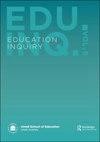Digital competence across boundaries - beyond a common Nordic model of the digitalisation of K-12 schools?
IF 1.6
Q2 EDUCATION & EDUCATIONAL RESEARCH
引用次数: 17
Abstract
ABSTRACT This paper explores policy related to digital competence and the digitalisation of Nordic K-12 schools. Anchored in some key transnational policies on digital competence, it describes some current Nordic movements in the national policies of Denmark, Finland, Norway and Sweden. The concept of boundary objects is used as an analytical lens, for understanding digital competence as a plastic and temporal concept that can be used to discuss the multi-dimensional translation of this concept in these Nordic countries. The paper ends with a discussion of the potential to view digital competence as a unifying boundary object that, with its plasticity, temporality and n-dimensionality, can show signs of common Nordic efforts in the K-12 school policy.跨越国界的数字能力——超越K-12学校数字化的共同北欧模式?
本文探讨了与数字能力和北欧K-12学校数字化相关的政策。它以一些关键的跨国数字能力政策为基础,描述了丹麦、芬兰、挪威和瑞典国家政策中当前的一些北欧运动。边界对象的概念被用作分析镜头,以理解数字能力作为一个可塑和时间的概念,可以用来讨论这个概念在这些北欧国家的多维翻译。本文最后讨论了将数字能力视为统一边界对象的可能性,该对象具有可塑性、时间性和n维性,可以显示北欧在K-12学校政策中共同努力的迹象。
本文章由计算机程序翻译,如有差异,请以英文原文为准。
求助全文
约1分钟内获得全文
求助全文
来源期刊

Education Inquiry
Social Sciences-Sociology and Political Science
CiteScore
5.00
自引率
0.00%
发文量
34
 求助内容:
求助内容: 应助结果提醒方式:
应助结果提醒方式:


